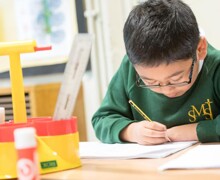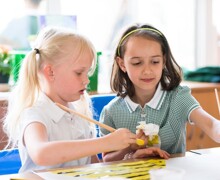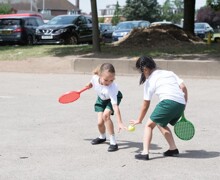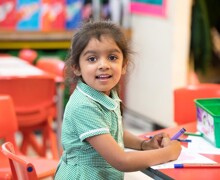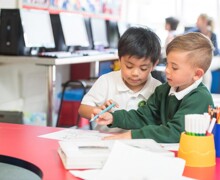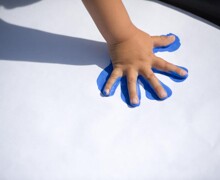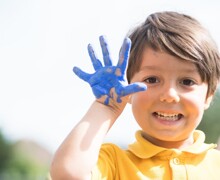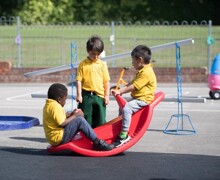Expression of interest
If you are interested in joining our Nursery or Reception classes please contact us to book on one of our tours or our open evening:
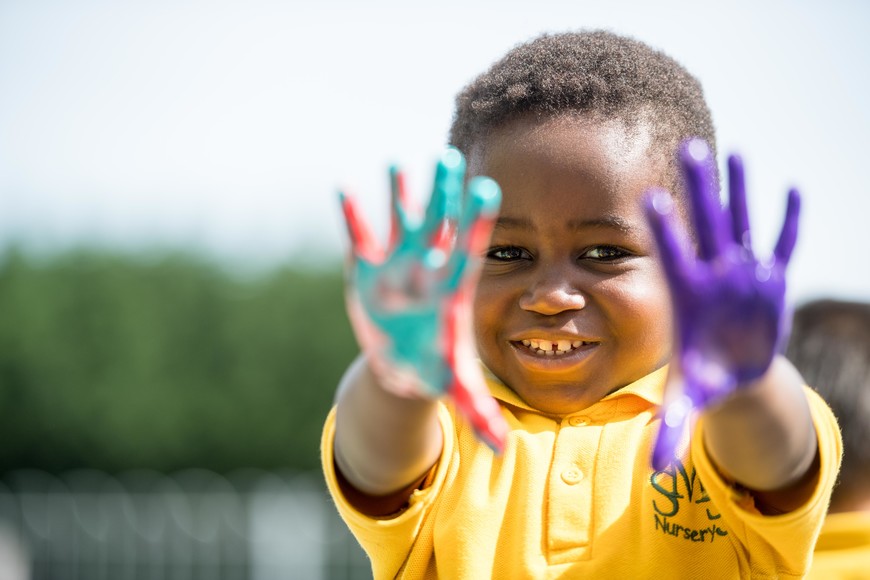
In the Early Years Foundation Stage our students are aged between three and five years old. We believe that every child deserves the best possible start to their school life, and we strive to give all our children the support and nurturing that enables them to fulfil their potential.
We want our students to learn and develop well and ensure they are kept healthy and safe. The Foundation Stage is a vital time in which our children settle into school life and are supported to become happy, confident, independent learners.
Excellent teaching and learning give children the broad range of knowledge and skills that provide the foundation for good future progress through school and life.
Overview of EYFS Curriculum
The curriculum covers seven areas of learning, consisting of three prime areas and four specific areas. All areas of learning and development are important and inter-connected.
The curriculum also promotes the key characteristics of effective learning: playing and exploring, active learning and creating and thinking critically.
These areas of learning and the teacher’s in-depth knowledge of the children’s next steps are used to plan activities for the children based on their individual development, interests and learning needs. The learning objectives are delivered through a combination of planned, purposeful play, with a balance of adult-led and child-initiated independent activities, more focused regular whole-class teaching sessions and small guided group work. These all aim to interest and motivate children so that they develop a love of learning. In phonics we follow the programme Essential Letters and Sounds, in English we are supported by the Power of Reading and in Maths are guided by the White Rose, Maths Mastery Programme. Learning takes place both in the classroom and outdoors and we deliver the curriculum through a range of exciting topics. These are also supported by workshops and real life experiences.
Early Learning Goals
Progress is closely monitored by our experienced Early Years staff and recorded in individual student profiles online, on a programme called Tapestry, and individual special books. Tapestry allows parents to get regular updates about their child’s learning and next steps and it enables them to easily contribute to their child’s profile throughout the year, leading to a well-rounded picture of each child. At the end of the foundation stage, an EYFS profile will be completed for each child and shared with their parents/carers. Parents are made aware of their child’s progress at regular intervals throughout the year and communication is regular, ensuring that children are supported by a strong home school partnership.
|
Communication and Language
|
Listening, Attention and Understanding
- Listen attentively and respond to what they hear with relevant questions, comments and actions when being read to and during whole class discussions and small group interactions.
- Make comments about what they have heard and ask questions to clarify their understanding.
- Hold conversation when engaged in back-and-forth exchanges with their teacher and peers.
Speaking
- Participate in small group, class and one-to-one discussions, offering their own ideas, using recently introduced vocabulary.
- Offer explanations for why things might happen, making use of recently introduced
- vocabulary from stories, non-fiction, rhymes and poems when appropriate.
- Express their ideas and feelings about their experiences using full sentences, including use of past, present and future tenses and making use of conjunctions, with modelling and support from their teacher.
|
|
Personal, Social and Emotional Development
|
Self – Regulation
- Show an understanding of their own feelings and those of others, and begin to regulate their behaviour accordingly.
- Set and work towards simple goals, being able to wait for what they want and control their immediate impulses when appropriate
- Give focused attention to what the teacher says, responding appropriately even when engaged in activity, and show an ability to follow instructions involving several ideas or actions.
Managing Self
- Be confident to try new activities and show independence, resilience and perseverance in the face of challenge.
- Explain the reasons for rules, know right from wrong and try to behave accordingly.
- Manage their own basic hygiene and personal needs, including dressing, going to the toilet and understanding the importance of healthy food choices.
Building Relationships
- Work and play cooperatively and take turns with others.
- Form positive attachments to adults and friendships with peers.
- Show sensitivity to their own and to others’ needs
|
| Physical Development |
Gross Motor Skills
- Negotiate space and obstacles safely, with consideration for themselves and others.
- Demonstrate strength, balance and coordination when playing.
- Move energetically, such as running, jumping, dancing, hopping, skipping and climbing.
Fine Motor Skills
- Hold a pencil effectively in preparation for fluent writing – using the tripod grip in almost all cases.
- Use a range of small tools, including scissors, paintbrushes and cutlery.
Begin to show accuracy and care when drawing.
|
Specific Areas of Learning
| Literacy |
Comprehension
- Demonstrate understanding of what has been read to them by retelling stories and narratives using their own words and recently introduced vocabulary.
- Anticipate (where appropriate) key events in stories.
- Use and understand recently introduced vocabulary during discussions about stories, non- fiction, rhymes and poems and during role play.
Word Reading
- Say a sound for each letter in the alphabet and at least 10 digraphs.
- Read words consistent with their phonic knowledge by sound-blending.
- Read aloud simple sentences and books that are consistent with their phonic knowledge, including some common exception words.
Writing
- Write recognisable letters, most of which are correctly formed.
- Spell words by identifying sounds in them and representing the sounds with a letter or letters.
Write simple phrases and sentences that can be read by others. |
| Mathematics |
Number
- Have a deep understanding of number to 10, including the composition of each number.
- Subitise (recognise quantities without counting) up to 5.
- Automatically recall (without reference to rhymes, counting or other aids) number bonds up to 5 (including subtraction facts) and some number bonds to 10, including double facts.
Numerical Patterns
- Verbally count beyond 20, recognising the pattern of the counting system.
- Compare quantities up to 10 in different contexts, recognising when one quantity is greater than, less than or the same as the other quantity.
- Explore and represent patterns within numbers up to 10, including evens and odds, double facts and how quantities can be distributed equally.
|
|
Understanding of the World
|
Past and Present
- Talk about the lives of the people around them and their roles society.
- Know some similarities and differences between things in the past and now, drawing on their experiences and what has been read in class.
- Understand the past through settings, characters and events encountered in books read in class and storytelling.
People, Culture and Communities
- Describe their immediate environment using knowledge from observation,
- discussion, stories, non-fiction texts and maps.
- Know some similarities and differences between different religious and cultural communities in this country, drawing on their experiences and what has been read in class.
- Explain some similarities and differences between life in this country and life in other countries, drawing on knowledge from stories, non-fiction texts and (when appropriate) maps.
The Natural World
- Explore the natural world around them, making observations and drawing pictures of animals and plants.
- Know some similarities and differences between the natural world around them and contrasting environments, drawing on their experiences and what has been read in class.
- Understand some important processes and changes in the natural world around them, including the seasons and changing states of matter.
|



